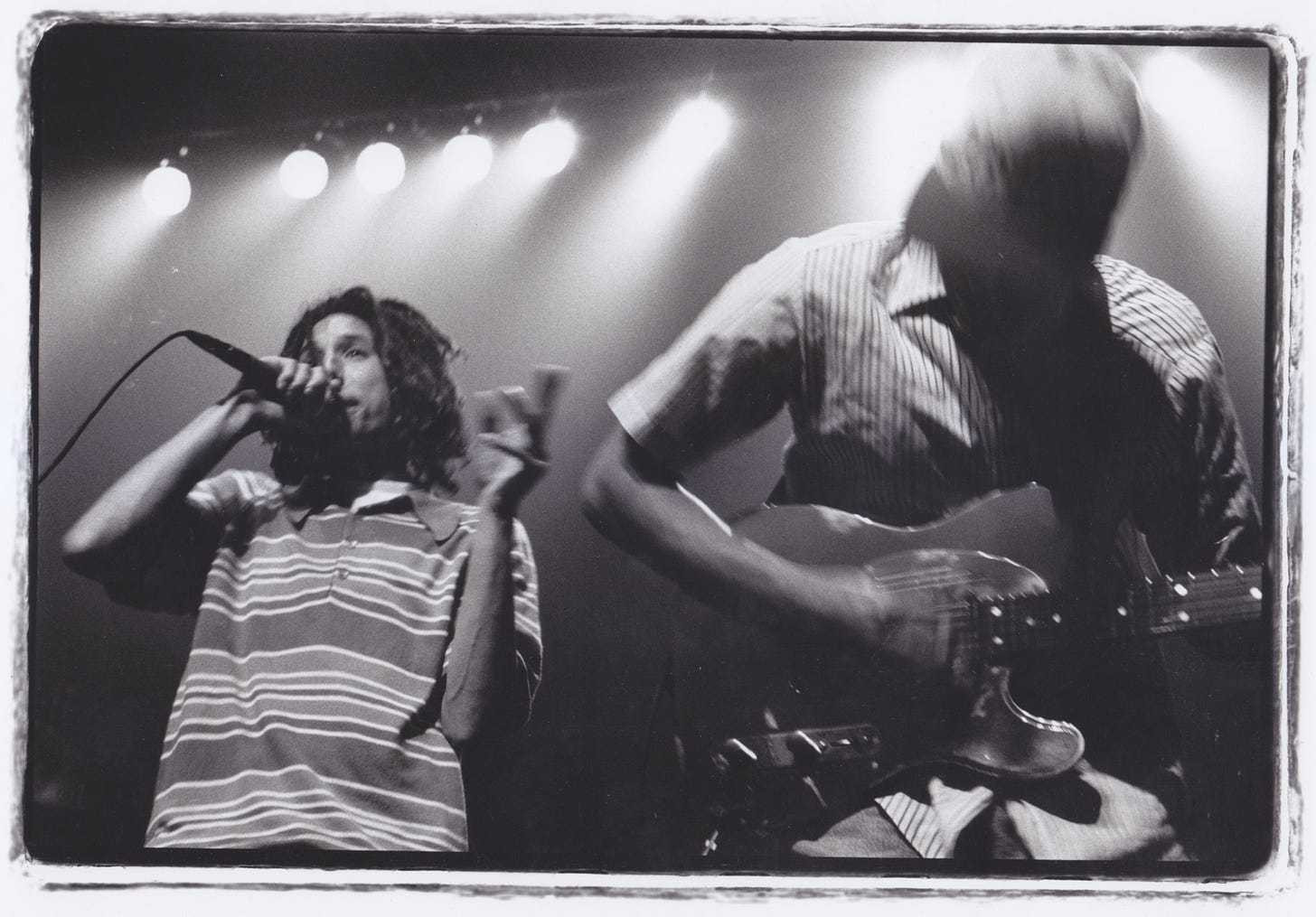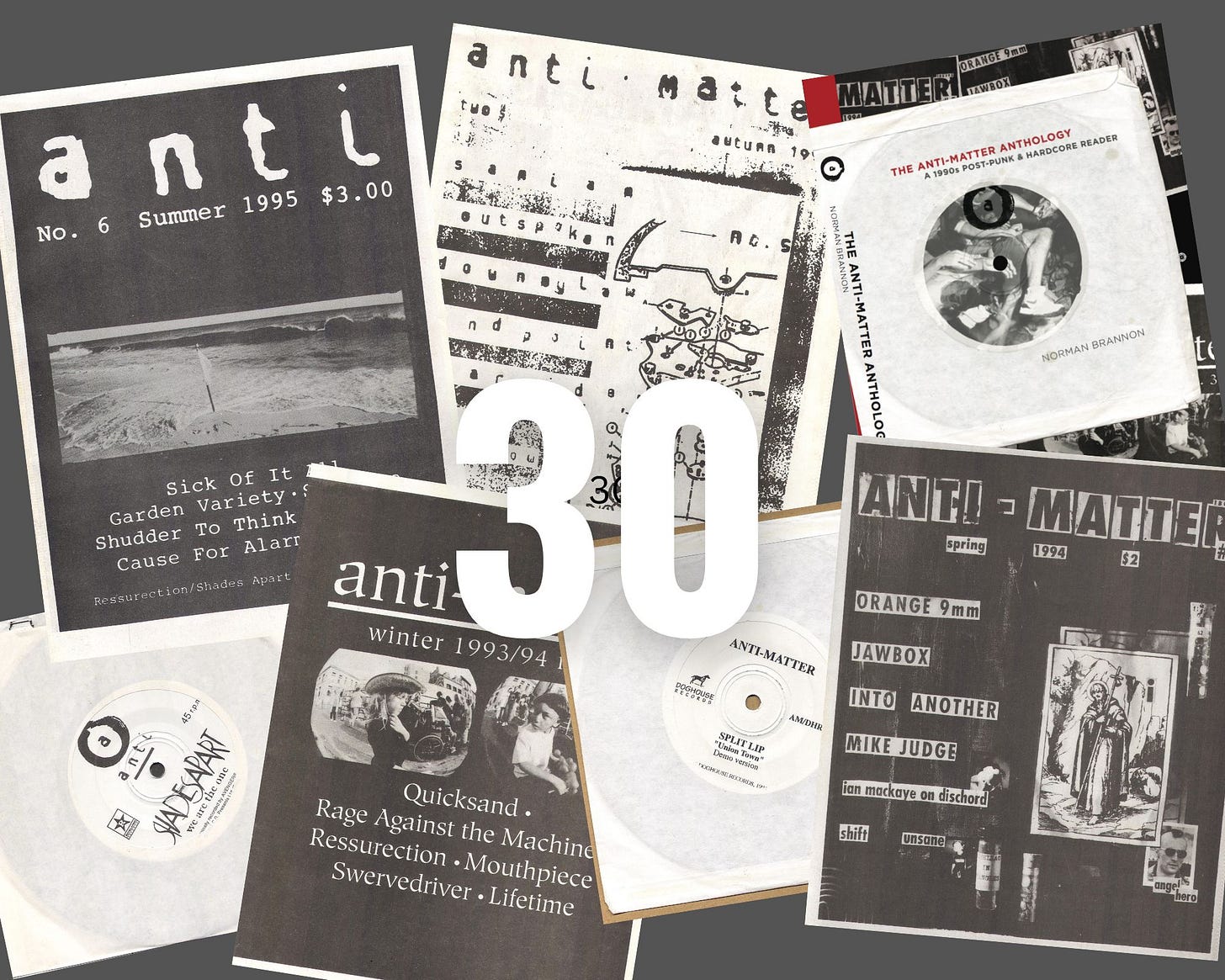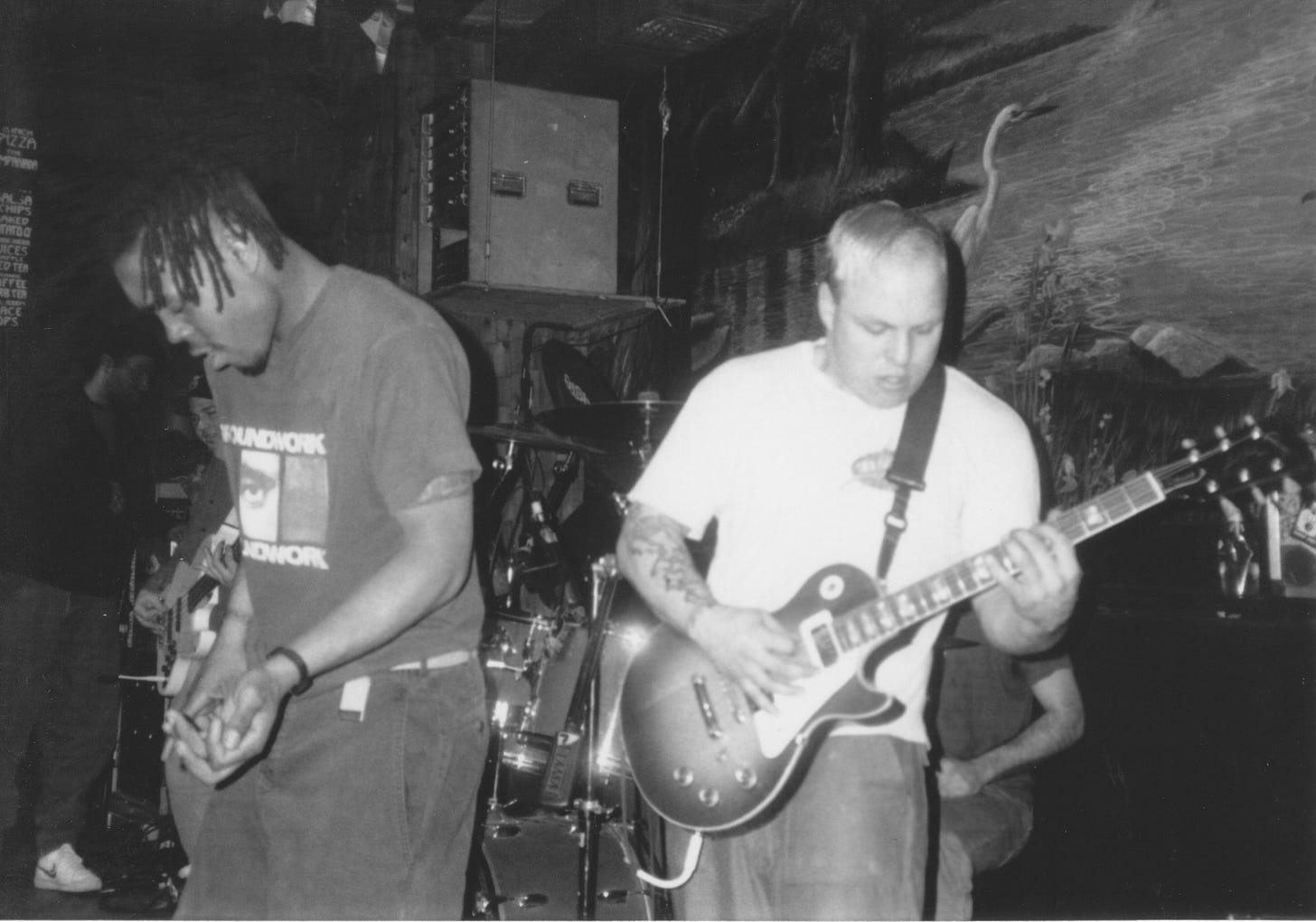30 Years of Anti-Matter
On the official week of its 30th anniversary, I take this opportunity to recall five of Anti-Matter's most memorable moments.
This week officially marks the 30th anniversary of the first issue of Anti-Matter. Last year, when I realized this milestone was approaching, I began to think of several different ways to celebrate it. Still, I had no idea a relaunch was in the future. Something like this would have been inconceivable to me even a year ago, so the fact that I can talk about this in the present tense is incredibly special to me.
Despite the fanzine itself being relatively short-lived, the concept and ethos of Anti-Matter has persisted—through the Punk Planet columns, the compilation album, the anthology book, and even the Instagram Live interviews during the 2020 lockdown—and with every new iteration, including this one, I am grateful to discover that this kind of work continues to resonate with older and younger generations of hardcore kids alike. When I say, “we believe that hardcore is more than music,” I mean to say that we are a community of people, we carry a wide range of experiences and convictions, and while the music brings us together, the love is why we stay. If this fanzine has a “legacy,” it’s because that message still means something.
To commemorate 30 years, I’ll be going rogue this week. For one thing, I wanted to acknowledge the fact that I have received dozens of messages from subscribers who told me they did not know what Anti-Matter was before the relaunch—people who, it can be safe to assume, have never read any of the interviews from the original zine. So this week, on Thursday, I’ll be republishing one of my favorite-ever interviews from the archive. It’s a conversation that has really held up over time with one of the best-known figures from our scene. More on that in a minute. But for now, instead of the usual essay, I wanted to use this space to look back on some of the zine’s most memorable moments over the years, both in print and off. Here are my Top 5 memories of Anti-Matter:

That time I asked Rage Against the Machine’s Zack de la Rocha about the last time he cried.
First, let’s put the lid on the coffin of this question right now: I was not the first fanzine writer to ask someone about the last time they cried. That was Kent McClard of No Answers fanzine—and later Ebullition Records—and his fanzine was, without question, the reason why I thought something like Anti-Matter could be possible. Kent’s interviews were expansive and humanizing, and his style left a major imprint on what a hardcore interview could look like. He was, in fact, the first person to ask Mike Judge about the last time he cried—stemming from the Judge lyric, “I can still remember the last time I cried”—and I have never wanted to take credit for it.
For this particular interview, though, I decided that a question like that was important: In 1993, Rage Against the Machine were still in the middle of crashing into the mainstream consciousness, so Zack was pretty intent on using the few interviews he did as a platform for activism. Since much of our conversation dealt with those issues, I felt like I needed to bring it back to a personal level, so when I asked Zack about the last time he cried, he just smiled, almost resigned, and said, “That’s good!” He went on to tell me the story, and it got very real:
I was in London. I was talking to a journalist who was friends with someone I had met out in Europe. He came to do an interview, but I said no. But he had heard about my father [Beto de la Rocha of the Chicano art collective Los Four] and he wanted to talk about him. I told him that as long as he didn’t print anything I fucking said about my father that I’d talk to him about it. So he swore to me that he wouldn’t, and then asked what my dad was doing now. My dad had a nervous breakdown in 1983 and has been mentally ill since then… He was someone I had looked up to tremendously and still do… So anyway, he was bugged. He had a wire, and he printed everything I said. Everything… He printed all this stuff I would’ve never told anyone. I don’t mind talking to you. I’ve known you for a while, and we’ve experienced a lot of the same things. But this was Melody Maker. And I read it in an airport on the way home. I cried uncontrollably for at least a couple of days. If I see him now, he’s dead.
That time I tried to convince Quicksand that one of their album outtakes was one of the best songs they had.
As soon as I started working on the Anti-Matter compilation album, the very first song I knew I needed to have was “Shovel” by Quicksand. They had just released Manic Compression, which I loved, but I was also privy to a handful of album outtakes and was completely perplexed over how this song did not make the cut. I asked Alan Cage about it and he just shrugged: “It wasn’t as good as the others,” he said.
“It might be one of your top three best songs,” I replied.
Either way, when I asked if I could make it the lead track on the comp, the band agreed—and when the world finally heard it, everyone else heard what I did.
To this day, it’s still a song that shows up on Quicksand setlists and fan-favorite conversations. It’s also a point of pride for me: Several years ago, while hanging out with Alan, he pulled me aside and said, “By the way, that thing about ‘Shovel’? You were right.”
That time Richie Birkenhead from Into Another inadvertently saved my life by talking about therapy.
Mental health and self-care are everyday hashtags on Instagram in 2023, but 30 years ago, no one in our community ever talked about it. We’d scoff at people for being “crazy” or “losing it,” but we didn’t seem to know what it meant to get help or to work on ourselves. To our detriment, we sometimes believed our friends and our scene could provide all the help we needed. So when I asked Richie to tell me something about himself that I didn’t know and wouldn’t know unless he told me, I was surprised to hear that he showed up to our interview right after a session of psychotherapy.
“I started getting a little more depressed than usual, and I was in a lot of emotional pain,” he explained. “Some people close to me suggested that maybe I should see someone about it, but I was like, ‘No fucking way.’ I had a really bad experience with it briefly when I was in high school, and I thought that no therapist could really do anything for me… [But] so far, it’s been a really good thing. It’s just a place to just talk, really, which is important.”
I was 20 years old when I did this interview. I was struggling personally, financially, and creatively. I was still very deeply closeted. I was suffering from depression and I needed help. Talking to Richie inspired me to find it, and I started going to therapy whenever I could afford it. The first time I ever told anyone I was gay, out loud, was in therapy. That alone was a life-saving moment for me that affirmed a future was possible, and I’m not sure that would have happened without this interview.
That time Porcell from Youth of Today, Judge, and Project X admitted to getting stoned at a Morrissey show.
You have to understand, “breaking edge” in the ‘90s was kind of a big deal. Survivors of the 1980s straightedge boom were particularly proud creatures, and “sellouts” were quickly marginalized from a scene that was trying to rebuild itself with an even greater sense of discipline and dedication—their words, not mine—than that of the previous era. So when one of the scene’s true figureheads came clean about smoking pot in a fanzine, people noticed.
“It was just like high school, we went to the bathroom and smoked pot in the stalls,” Porcell told me. “I hadn’t smoked pot in so long I didn’t think that one joint was going to do anything for me. I was like, ‘Are you sure this is enough? I mean, if we're gonna break the edge, we better get stoned!’ I remember just watching Morrissey and freaking out. We had fourth-row center seats, and it was so strange. Everything was moving slowly, and… How can I describe it? I don't know. I remember that I kind of enjoyed the concert, and that when we walked out, I was getting super-duper paranoid. I was like, ‘Dude, there’s so many people, man. We’re like rats in a cage! We’re like a bunch of ants!’”
For this week’s interview, I’m going back into the archive to publish this 1995 interview in its entirety. Whether you’ve read it before or not, I feel like it’s one of the quintessential Anti-Matter interviews—intimate, friendly, surprising, and even kind of hilarious. More than any other, this one is pure storytelling and particularly timeless. Look for it on Thursday.
That time Chaka Malik from Burn and Orange 9mm cried on the Anti-Matter livestream.
Look, we were all kind of emotional during lockdown. It was a time of great uncertainty, and for many of us, loneliness. It was the reason why, when I launched a series of Instagram Live chats with different musicians from the Anti-Matter universe and beyond, I called it “The Isolation Interviews.” For two weeks, hundreds of us came together for conversations and bedroom performances that I vowed I wouldn’t save or republish—and I’ve kept true to that. These were meant to be experienced live, in a certain context, at a certain time.
Chaka is a longtime friend, and our conversation flowed naturally because it had already been so long since we last talked. We were “catching up” more so than “doing an interview,” and by the time we got to the performance—I played guitar while he sang to Orange 9mm’s “Suspect”—the whole thing just felt like a real moment of connection that both of us clearly felt. I didn’t expect him to get so raw, but when we finished the song, he expressed a deep sense of relief from the connective experience, and that led him to cry. It was a beautiful and honest moment that I never forgot because it reminded me that even though the hardcore scene tends to place value on “harder” emotions, I always hoped Anti-Matter could exist to remind us that, in fact, we feel it all.
Coming on Thursday to Anti-Matter: An archived conversation with John Porcelly of Youth of Today, Judge, and Shelter.
Anti-Matter is reader-supported. If you’ve valued reading this, please consider becoming a paid subscriber and backing independent, ad-free hardcore media. Thank you, friends.







Congratulations on the anniversary. 30 years of a project, across iterations, is an amazing accomplishment.
Holy shit! Just stumbled on this and reflecting back on the days. Congrats on 30! Saw Quicksand on the 30th Slip tour and was thinking about Shovel and the Anti-Matter Compilation.